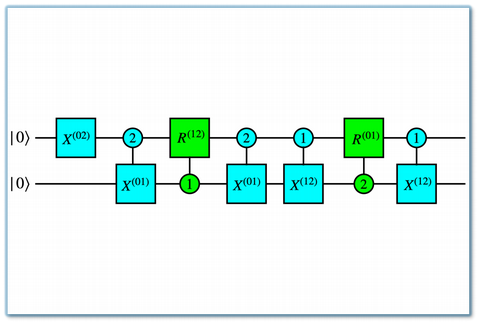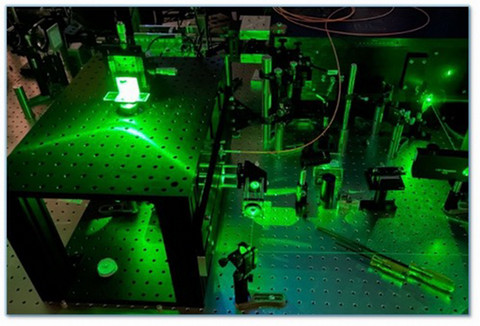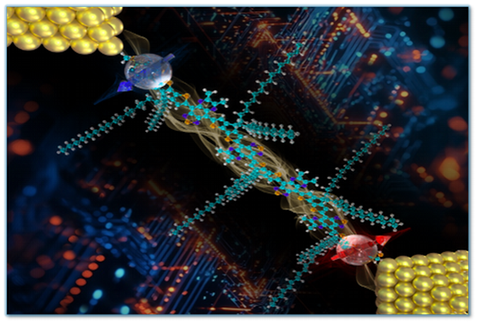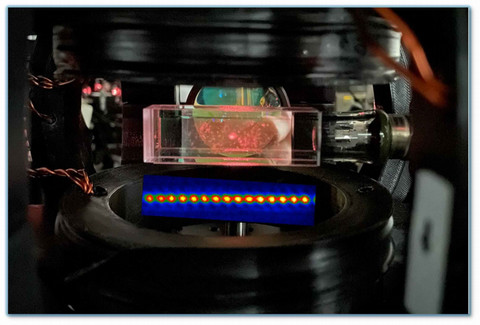Quantum Computing and Simulation
 Research in Quantum Computing and Simulation explores the development and application of quantum mechanical principles to perform computations and simulate complex physical systems beyond the capabilities of classical computers. This field encompasses the design of quantum algorithms that leverage phenomena such as superposition and entanglement to solve problems in cryptography, optimization, and materials science more efficiently. It also includes the study of quantum architectures—such as superconducting qubits, trapped atoms, and photonic systems—and the engineering of scalable, fault-tolerant quantum platforms. Researchers at UM investigate both hardware and software implementations, aiming to bridge theoretical advances with practical applications in chemistry, condensed matter physics, and machine learning. As quantum technologies evolve, simulation plays a crucial role in modeling quantum systems themselves, enabling deeper insights into quantum behavior and guiding the development of future quantum devices.
Research in Quantum Computing and Simulation explores the development and application of quantum mechanical principles to perform computations and simulate complex physical systems beyond the capabilities of classical computers. This field encompasses the design of quantum algorithms that leverage phenomena such as superposition and entanglement to solve problems in cryptography, optimization, and materials science more efficiently. It also includes the study of quantum architectures—such as superconducting qubits, trapped atoms, and photonic systems—and the engineering of scalable, fault-tolerant quantum platforms. Researchers at UM investigate both hardware and software implementations, aiming to bridge theoretical advances with practical applications in chemistry, condensed matter physics, and machine learning. As quantum technologies evolve, simulation plays a crucial role in modeling quantum systems themselves, enabling deeper insights into quantum behavior and guiding the development of future quantum devices.
Quantum Sensing
 Research in Quantum Sensing focuses on exploiting quantum phenomena—such as superposition, entanglement, and quantum coherence—to achieve ultra-sensitive measurements and high-resolution imaging capabilities that surpass classical limits. This field encompasses the development of quantum sensors for detecting tiny changes in physical quantities like magnetic and electric fields, temperature, and gravity, with applications ranging from fundamental physics experiments to biomedical diagnostics and navigation. Quantum-enhanced techniques are also revolutionizing imaging modalities, including spectroscopy, magnetic resonance imaging (MRI), nuclear magnetic resonance (NMR), and biomedical imaging by improving signal-to-noise ratios and enabling new contrast mechanisms. Advances in quantum measurement theory and precision metrology underpin these technologies, driving innovation in both experimental methods and theoretical models to unlock new regimes of sensitivity and resolution across diverse scientific and technological domains. Researchers at UM investigate quantum enhancement on laser spectroscopy, NMR, single-particle/moleclule measurement and imaging, magnetometer, and electric and temperature sensors.
Research in Quantum Sensing focuses on exploiting quantum phenomena—such as superposition, entanglement, and quantum coherence—to achieve ultra-sensitive measurements and high-resolution imaging capabilities that surpass classical limits. This field encompasses the development of quantum sensors for detecting tiny changes in physical quantities like magnetic and electric fields, temperature, and gravity, with applications ranging from fundamental physics experiments to biomedical diagnostics and navigation. Quantum-enhanced techniques are also revolutionizing imaging modalities, including spectroscopy, magnetic resonance imaging (MRI), nuclear magnetic resonance (NMR), and biomedical imaging by improving signal-to-noise ratios and enabling new contrast mechanisms. Advances in quantum measurement theory and precision metrology underpin these technologies, driving innovation in both experimental methods and theoretical models to unlock new regimes of sensitivity and resolution across diverse scientific and technological domains. Researchers at UM investigate quantum enhancement on laser spectroscopy, NMR, single-particle/moleclule measurement and imaging, magnetometer, and electric and temperature sensors.
Quantum Materials
 Research in Quantum Materials investigates the emergent properties of matter governed by quantum mechanics, with a focus on understanding and designing materials that exhibit novel quantum phenomena. This includes studies in condensed matter physics, such as superconductivity, topological phases, and strongly correlated electron systems, as well as quantum chemistry approaches to molecular structure and reactivity. Researchers at UM investigate novel quantum materials such as strongly correlated and low-dimensional systems, molecular electronics, 2D materials, perovskites, and color centers in diamonds and other solids. Theoretical and experimental efforts aim to uncover new states of matter, develop materials for quantum technologies, and model complex interactions at the atomic and subatomic levels. By integrating insights from physics, chemistry, and materials science, quantum materials research drives innovation in energy, computation, and sensing applications.
Research in Quantum Materials investigates the emergent properties of matter governed by quantum mechanics, with a focus on understanding and designing materials that exhibit novel quantum phenomena. This includes studies in condensed matter physics, such as superconductivity, topological phases, and strongly correlated electron systems, as well as quantum chemistry approaches to molecular structure and reactivity. Researchers at UM investigate novel quantum materials such as strongly correlated and low-dimensional systems, molecular electronics, 2D materials, perovskites, and color centers in diamonds and other solids. Theoretical and experimental efforts aim to uncover new states of matter, develop materials for quantum technologies, and model complex interactions at the atomic and subatomic levels. By integrating insights from physics, chemistry, and materials science, quantum materials research drives innovation in energy, computation, and sensing applications.
Quantum Fundamentals
 Research in Quantum Fundamentals seeks to deepen our understanding of the foundational principles of quantum mechanics and their implications across physics, mathematics, computer science, chemistry, and biology. This area includes investigations into quantum entanglement, nonlocality, contextuality, and the measurement problem, as well as efforts to develop a general understanding of many-body quantum systems. The research in computer science explores how quantum fundamentals inform the limits of computation, networking, and crytography. While in chemistry and biology, quantum fundamentals inspire studies of quantum effects in molecular dynamics and biological processes. Researchers at UM explore quantum fundamentals in many-body quantum systems, information theory, quantum cryptography, molecular dynamics, and biological processes. By probing the conceptual and theoretical boundaries of quantum theory, this research aims to clarify its interpretation, uncover new physical phenomena, and guide the development of future quantum technologies.
Research in Quantum Fundamentals seeks to deepen our understanding of the foundational principles of quantum mechanics and their implications across physics, mathematics, computer science, chemistry, and biology. This area includes investigations into quantum entanglement, nonlocality, contextuality, and the measurement problem, as well as efforts to develop a general understanding of many-body quantum systems. The research in computer science explores how quantum fundamentals inform the limits of computation, networking, and crytography. While in chemistry and biology, quantum fundamentals inspire studies of quantum effects in molecular dynamics and biological processes. Researchers at UM explore quantum fundamentals in many-body quantum systems, information theory, quantum cryptography, molecular dynamics, and biological processes. By probing the conceptual and theoretical boundaries of quantum theory, this research aims to clarify its interpretation, uncover new physical phenomena, and guide the development of future quantum technologies.




 Research in Quantum Sensing focuses on exploiting quantum phenomena—such as superposition, entanglement, and quantum coherence—to achieve ultra-sensitive measurements and high-resolution imaging capabilities that surpass classical limits. This field encompasses the development of quantum sensors for detecting tiny changes in physical quantities like magnetic and electric fields, temperature, and gravity, with applications ranging from fundamental physics experiments to biomedical diagnostics and navigation. Quantum-enhanced techniques are also revolutionizing imaging modalities, including spectroscopy, magnetic resonance imaging (MRI), nuclear magnetic resonance (NMR), and biomedical imaging by improving signal-to-noise ratios and enabling new contrast mechanisms. Advances in quantum measurement theory and precision metrology underpin these technologies, driving innovation in both experimental methods and theoretical models to unlock new regimes of sensitivity and resolution across diverse scientific and technological domains. Researchers at UM investigate quantum enhancement on laser spectroscopy, NMR, single-particle/moleclule measurement and imaging, magnetometer, and electric and temperature sensors.
Research in Quantum Sensing focuses on exploiting quantum phenomena—such as superposition, entanglement, and quantum coherence—to achieve ultra-sensitive measurements and high-resolution imaging capabilities that surpass classical limits. This field encompasses the development of quantum sensors for detecting tiny changes in physical quantities like magnetic and electric fields, temperature, and gravity, with applications ranging from fundamental physics experiments to biomedical diagnostics and navigation. Quantum-enhanced techniques are also revolutionizing imaging modalities, including spectroscopy, magnetic resonance imaging (MRI), nuclear magnetic resonance (NMR), and biomedical imaging by improving signal-to-noise ratios and enabling new contrast mechanisms. Advances in quantum measurement theory and precision metrology underpin these technologies, driving innovation in both experimental methods and theoretical models to unlock new regimes of sensitivity and resolution across diverse scientific and technological domains. Researchers at UM investigate quantum enhancement on laser spectroscopy, NMR, single-particle/moleclule measurement and imaging, magnetometer, and electric and temperature sensors.  Research in Quantum Materials investigates the emergent properties of matter governed by quantum mechanics, with a focus on understanding and designing materials that exhibit novel quantum phenomena. This includes studies in condensed matter physics, such as superconductivity, topological phases, and strongly correlated electron systems, as well as quantum chemistry approaches to molecular structure and reactivity. Researchers at UM investigate novel quantum materials such as strongly correlated and low-dimensional systems, molecular electronics, 2D materials, perovskites, and color centers in diamonds and other solids. Theoretical and experimental efforts aim to uncover new states of matter, develop materials for quantum technologies, and model complex interactions at the atomic and subatomic levels. By integrating insights from physics, chemistry, and materials science, quantum materials research drives innovation in energy, computation, and sensing applications.
Research in Quantum Materials investigates the emergent properties of matter governed by quantum mechanics, with a focus on understanding and designing materials that exhibit novel quantum phenomena. This includes studies in condensed matter physics, such as superconductivity, topological phases, and strongly correlated electron systems, as well as quantum chemistry approaches to molecular structure and reactivity. Researchers at UM investigate novel quantum materials such as strongly correlated and low-dimensional systems, molecular electronics, 2D materials, perovskites, and color centers in diamonds and other solids. Theoretical and experimental efforts aim to uncover new states of matter, develop materials for quantum technologies, and model complex interactions at the atomic and subatomic levels. By integrating insights from physics, chemistry, and materials science, quantum materials research drives innovation in energy, computation, and sensing applications. Research in Quantum Fundamentals seeks to deepen our understanding of the foundational principles of quantum mechanics and their implications across physics, mathematics, computer science, chemistry, and biology. This area includes investigations into quantum entanglement, nonlocality, contextuality, and the measurement problem, as well as efforts to develop a general understanding of many-body quantum systems. The research in computer science explores how quantum fundamentals inform the limits of computation, networking, and crytography. While in chemistry and biology, quantum fundamentals inspire studies of quantum effects in molecular dynamics and biological processes. Researchers at UM explore quantum fundamentals in many-body quantum systems, information theory, quantum cryptography, molecular dynamics, and biological processes. By probing the conceptual and theoretical boundaries of quantum theory, this research aims to clarify its interpretation, uncover new physical phenomena, and guide the development of future quantum technologies.
Research in Quantum Fundamentals seeks to deepen our understanding of the foundational principles of quantum mechanics and their implications across physics, mathematics, computer science, chemistry, and biology. This area includes investigations into quantum entanglement, nonlocality, contextuality, and the measurement problem, as well as efforts to develop a general understanding of many-body quantum systems. The research in computer science explores how quantum fundamentals inform the limits of computation, networking, and crytography. While in chemistry and biology, quantum fundamentals inspire studies of quantum effects in molecular dynamics and biological processes. Researchers at UM explore quantum fundamentals in many-body quantum systems, information theory, quantum cryptography, molecular dynamics, and biological processes. By probing the conceptual and theoretical boundaries of quantum theory, this research aims to clarify its interpretation, uncover new physical phenomena, and guide the development of future quantum technologies.